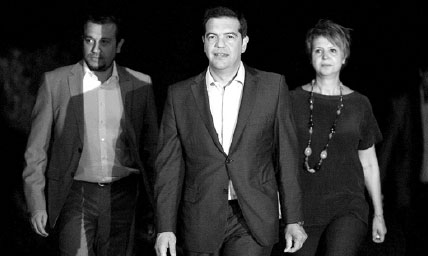Tsipras bets on early general election to boost reform mandate
Greece's president began the process of asking opposition leaders to form a new government on Friday, a day after Prime Minister Alexis Tsipras resigned and called an early election next month to deal with a governing party rebellion over Greece's third bailout deal.
The opposition has little chance of uniting and forming a government so quickly, meaning that after more than five years of a worsening financial crisis, Greece is headed for its fifth national election in six years. Although Tsipras is widely tipped to win the election again, if he fails to secure an outright majority he would have to seek a complex coalition that could hamper his ability to govern.
Outgoing government officials say the likeliest election date is Sept 20, just eight months after Tsipras' election on promises to fight creditor-demanded spending cuts and tax hikes, terms he later agreed to in order to secure a third bailout for Greece as its economy was on the brink of collapse.
President Prokopis Pavlopoulos was meeting on Friday with the head of the conservative New Democracy party, Evangelos Meimarakis, to ask him to try to form a government. If Meimarakis fails within the three-day limit, the next in line to try would be the head of the far-right Golden Dawn party, and potentially the centrist To Potami, who both have the same number of seats in the 300-member Greek Parliament.
None are believed to have enough allies to gain Parliament's support.
Announcing his resignation in a televised address late Thursday, Tsipras said he secured the best deal possible when he agreed to a three-year, 86 billion euro ($95 billion) bailout from other eurozone countries to save Greece from a disastrous exit from the shared euro currency.
But the deal came with strict terms for more belt-tightening.
Tsipras' reversal in accepting the demands by creditors led to outrage among hard-liners in his Syriza party. About one in four Syriza lawmakers refused to back the bailout's ratification in Parliament last week, which was approved only with backing from opposition parties.
Tsipras had delayed a decision on whether to call new elections until after Greece received its first installment from the new bailout and made a debt repayment to the European Central Bank; it did both on Thursday.
"Now that this difficult cycle has ended ... I feel the deep moral and political obligation to set before your judgment everything I have done, both right and wrong, the achievements and the omissions," he said. Tsipras insists he had to accept the unpalatable bailout terms to keep Greece in the euro. He is betting on a stronger mandate if polls are held before voters feel the impact of the new steep tax hikes and spending cuts.
|
Greek Prime Minister Alexis Tsipras flanked by his aides, exits the presidential palace in Athens after presenting his resignation. AFP |
(China Daily 08/22/2015 page11)















